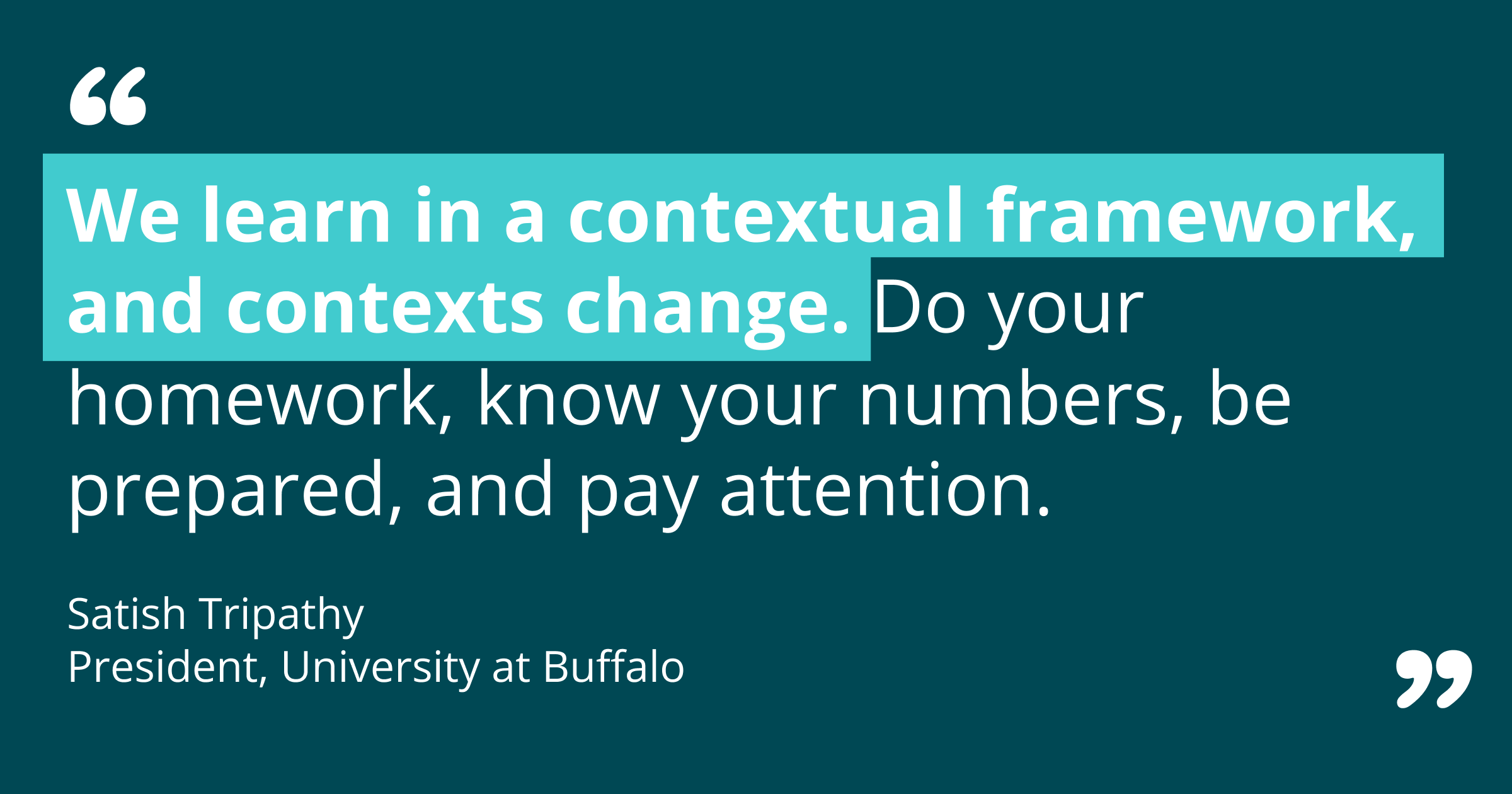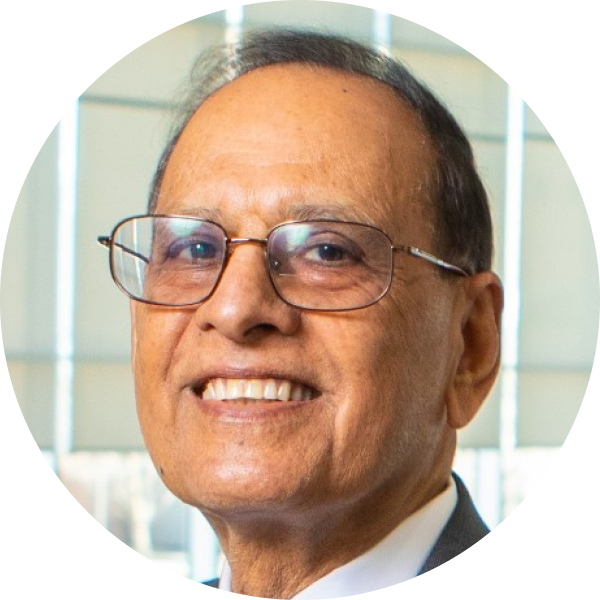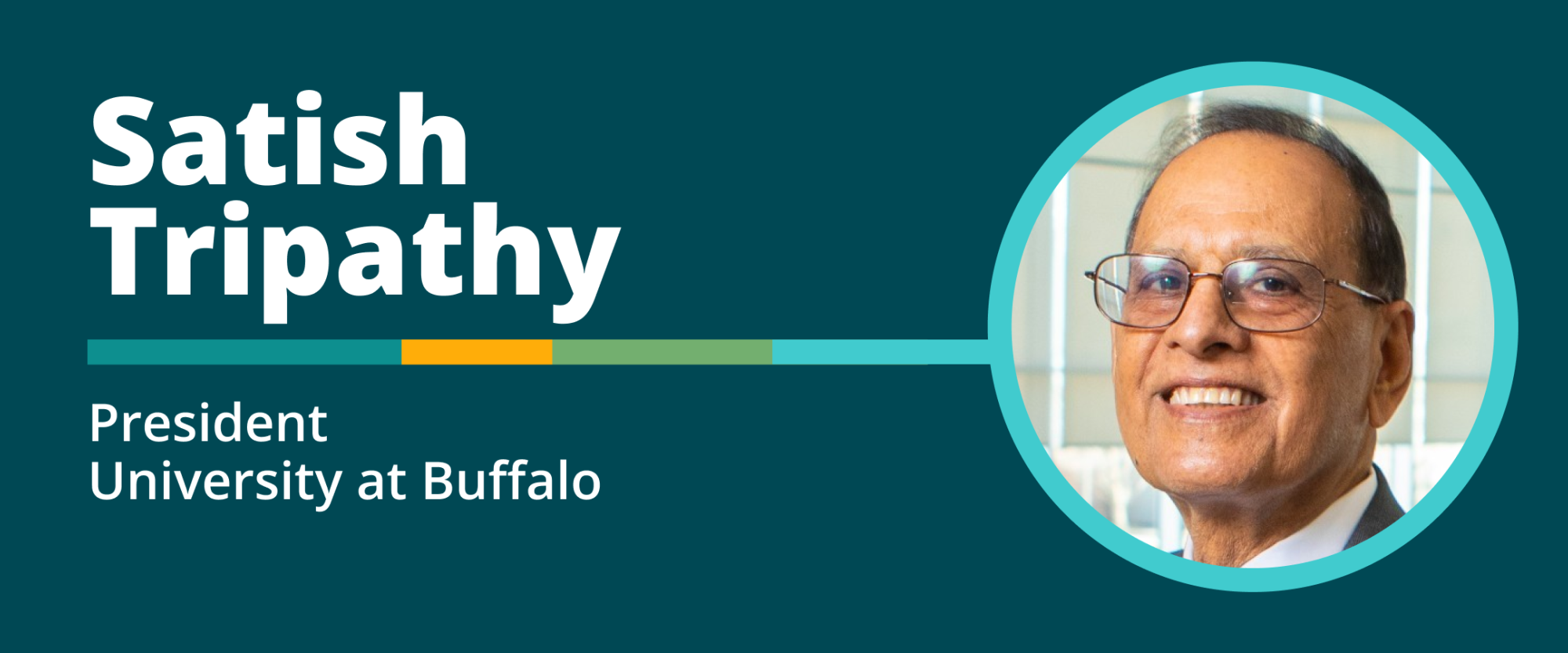In 2024, the University Innovation Alliance (UIA) was proud to add two new member institutions. One of them, University at Buffalo (UB), was recently designated as flagship institution of the State University of New York (SUNY) system. As part of the Weekly Wisdom series, we had the honor of sitting down with UB’s President Satish Tripathi on the Innovating Together Podcast, where he talked about his unlikely path to leading one of the nation’s top research universities, the core elements of what makes a successful institution, how to develop your personal leadership style, and the importance of learning from context and history.
Discovering Possibilities in the World of Higher Education
President Tripathi’s career in education began modestly, without any leadership aspirations. He recalled:
“I grew up in a small village in India. My goal was to become a fourth-generation teacher in a family of teachers. I wanted to be a high school math teacher, went to college, and realized that I could really teach in a college. I came to Canada for my Ph.D. The most influential person early in my career was my advisor, Ken Savchuk, who was not a university president or a dean, but he taught me how to give responsibilities to others and how to trust and encourage them. I thought, ‘This is good for me as a university professor to work with my graduate students,’ and that's all I was looking at. I never wanted to be a president or dean or department chair. My learning was listening to and looking at people, but no formal education to be a leader.
“I became chair at a very early age, 37, of a department with 50 faculty, 250 graduate students, a large number of undergraduates, and I had a great time. I also had the best research portfolio, and that encouraged me to think about being responsible for organizations. And when I talk to faculty members, I tell them, ‘If you get a chance, be a chair of the department. But continue to do research or teaching at the same time.’”
Leadership Provides Opportunities to Create
After fulfilling his department chair obligations, President Tripathi was happy to resume his duties as a professor. Seven years later, his appointment as college dean was somewhat surprising:
“I went to UC Riverside to give a talk in the computer science department. They had started a new school of engineering; it wasn't going anywhere. They arranged a dinner with Chancellor Ray Orbach, and he asked me, ‘What will it take to establish a new school of engineering?’ And I said, ‘I really have no clue.’ We started talking, and I told him that you need 15 new faculty lines, you need a building, you need this and that. I thought, ‘I'll get rid of him asking these things,’ and then he came back in a week and said, ‘I've got the resources.’ That actually gave me an inflection point whether I wanted to create something. I could still do my research, but probably I would never get another chance like this to create something.
“My older son was already on the West Coast in college, the second was finishing high school. It was a calculated risk. I could always be a professor anyway. This gave me a chance to create something new, and a school of engineering, develop the department, still have the programs, and I thought, ‘This is great.’ If I had thought a lot more, maybe I would not have gone, but this was a chance to take that deep dive into creating something. And that was the best decision for me.
“And something I learned during that time: you don't look for your next job. You do the job you're doing the best you can, and opportunities come.”
What Matters Most in a University Ecosystem
We asked President Tripathi to share his favorite accomplishments during his two decades of leadership at UB. He listed these three:
“The main thing is to be able to hire the best people that I can. Presidents and provosts come and go. It's the faculty who remain. And to make an institution better, the faculty that you hire is going to matter. And the second part is the success of our students. If you look at how much improvement we have made on the campus, that has been a major part of it. As a state university, one-third of our students are Pell eligible, and we have been trying to close the gap. It’s gone bad a little bit after the pandemic, but we are still closing the gap. So, I'm proud of the improvements and the progress that we have made in both the student and faculty directions.
“In addition, Buffalo is having an economic renaissance. It was one of the richest cities 100 years ago. It's one of the poorest now. And we are part of the economic engine in the city. It's not me who has done it. It's the institution, the faculty that we have attracted to Western New York, and the students’ academic success that has gone on. A lot of other smaller things we can talk about: our research productivity has gone up, and our research funding. We are getting the Empire AI $400 million investment by the state consortium. All those things are good, but I’d say those three core points: faculty, students, economic engine.”
Like everyone else in higher education, University at Buffalo struggled with the COVID pandemic’s chilling effects on growth and progress. However, President Tripathi noted, being a research institution was a built-in advantage:
“We had our medical and public health schools, and our own experts are nationally recognized. The provost took charge of a great team, so we did well in terms of how much we could do and what we could provide. We can be prepared as much we can, but when the first punch comes, we have to think on the fly. I think we can always learn from what others did and didn’t do. We can always try to learn.”
Learning Tips for Higher Education Leaders
We designed the Weekly Wisdom series as a platform for higher ed leaders to share leadership advice, and President Tripathi offered us plenty of wise words:
“It's not just one piece of advice that changes you. You observe people and develop your own authentic style as opposed to somebody telling you what to do. I feel that as a leader, you've got to be humble and strong. People think those are contradictory, but they're not. You have to have a strong team who can challenge you, not just listen to you. You always have to listen. There's no time when you can say, ‘I've learned everything that I need to know.’
“At the same time, you have to give your team room to make their own decisions. I'm not a micromanager. We talk about it either before or after, and that has served me really well. People have responsibility, they understand the principles that we have, and they're all smart. That's how I work with the people that I have here.
“But really, it's not one person. Putting the institution first is important, not how it's going to impact you. I made decisions both as provost and as president that have not been good for me personally but good for the institution, and I'm proud of those.”
When rising leaders ask his advice, he has a few general suggestions for them:

“I tell them to always learn. Things that we have learned have been in a contextual framework, and contexts change. That means do your homework, know your numbers, be prepared. And pay attention to what's going on around you and its impact on higher education around the country and around the world. An institution exists in a context.
“Leadership is tough work, so be prepared to work. People are going to depend on you, and the decisions you make will have much deeper implications than you think. Never compromise your integrity. Once people know that you have integrity, they're going to respect you no matter what decision you make.”
How Reading Informs Leadership
We also like to leave our podcast audience with a reading recommendation from our guest, and President Tripathi reminded us that the best books aren’t always about leadership:
“Some of the best books are history books. I would recommend Team of Rivals by Doris Goodwin. It talks about how you get your rivals to work with you, how you get consensus. That's so important. What we learn from history is useful, and how we use it can be critically important.”
Note: This interview in the Weekly Wisdom Series originally aired on October 21, 2024 as part of the University Innovation Alliance’s Innovating Together Podcast, appearing live on YouTube, Facebook, Twitter, and LinkedIn.
Resources Mentioned in this Episode
- Satish Tripathi
- University at Buffalo
- Exciting Growth for the University Innovation Alliance
- University of California Riverside
- Raymond L. Orbach (former Chancellor, University of California Riverside)
- Empire AI (a consortium of institutions and foundations with the mission of establishing New York State as a national model for developing and implementing responsible artificial intelligence technology)
- Team of Rivals: The Political Genius of Abraham Lincoln by Doris Kearns Goodwin
Bios of Guest and Co-Hosts

Dr. Satish K. Tripathi is the 15th president of SUNY Buffalo. Since the start of his tenure in 2011, President Tripathi has made UB one of the nation’s leading research universities by expanding its reach and impact locally and globally. During his presidency, the university has opened six major building projects on its three campuses, including the $375-million Jacobs School of Medicine and Biomedical Sciences, the hub of a thriving life sciences community that anchors UB’s downtown campus. In 2018, President Tripathi launched UB’s comprehensive Boldly Buffalo campaign, which has transformed the university’s impact throughout Western New York. He continues to focus on positioning UB among the nations’ top 25 public research universities. In 2022, Governor Kathy Hochul designated UB a flagship institution of the State University of New York system, recognizing UB’s reputation as a premier public research university, its leadership in public higher education, and its commitment to bring the benefits of its research, clinical care and education to the region, state, nation, and world. Prior to his current role, President Tripathi served as UB’s Provost and Executive Vice President for Academic Affairs, where he co-created and shepherded UB 2020, a long-range academic plan that led the university to achieve significant growth in research and scholarly activity and enhance the academic profile of UB’s undergraduate and graduate students. From 1997-2004, he served as Dean of the Bourns College of Engineering at the University of California-Riverside, where he led the college’s rise from an unranked program to a position in the upper half of the U.S. News and World Report Best Engineering Graduate Schools rankings. Dr. Tripathi’s 19 years at the Department of Computer Science at the University of Maryland included a sabbatical during which he held visiting professorships at France’s University of Paris-Sud and Germany’s University of Erlangen-Nuremberg. He graduated at the top of his class from Banaras Hindu University (BHU) in India and holds a doctorate in computer science from the University of Toronto, as well as three master’s degrees – one in computer science from the University of Toronto and two in statistics from the University of Alberta and BHU.

Co-Host: Bridget Burns, Executive Director, University Innovation Alliance
Dr. Bridget Burns is the founding Executive Director of the University Innovation Alliance (UIA). For the past decade, she has advised university presidents, system chancellors, and state and federal policy leaders on strategies to expand access to higher education, address costs, and promote completion for students of all backgrounds. The UIA was developed during Bridget’s tenure as an American Council on Education (ACE) Fellowship at Arizona State University. She held multiple roles within the Oregon University System, including serving as Chief of Staff and Senior Policy Advisor, where she won the national award for innovation in higher education government relations. She was a National Associate for the National Center for Public Policy and Higher Education, and has served on several statewide governing boards including ones governing higher education institutions, financial aid policy, and policy areas impacting children and families.

Co-Host: Doug Lederman, Editor and Co-Founder, Inside Higher Ed
Doug Lederman is editor and co-founder of Inside Higher Ed. With Scott Jaschik, he leads the site's editorial operations, overseeing news content, opinion pieces, career advice, blogs and other features. Doug speaks widely about higher education, including on C-Span and National Public Radio and at meetings and on campuses around the country. His work has appeared in The New York Times and USA Today, among other publications. Doug was managing editor of The Chronicle of Higher Education from 1999 to 2003, after working at The Chronicle since 1986 in a variety of roles. He has won three National Awards for Education Reporting from the Education Writers Association, including one for a 2009 series of Inside Higher Ed articles on college rankings. He began his career as a news clerk at The New York Times. He grew up in Shaker Heights, Ohio, and graduated in 1984 from Princeton University. Doug and his wife, Kate Scharff, live in Bethesda, MD.
About Weekly Wisdom
Weekly Wisdom is an event series that happens live on Facebook, Twitter, and LinkedIn. It also becomes a podcast episode. Every week, we join forces with Inside Higher Ed and talk with a sitting college president or chancellor about how they're specifically navigating the challenges of this moment. These conversations will be filled with practicable things you can do right now by unpacking how and why college leaders are making decisions within higher education. Hopefully, these episodes will also leave you with a sense of optimism and a bit of inspiration.
Rate, Review & Subscribe
Learn why hundreds of people have rated this new podcast 5 stars! Please join others and rate and review this podcast. This helps us reach and inform more people -- like you -- to help increase the number of college graduates in the United States.
Click here, scroll to the bottom, tap to rate with five stars, and select “Write a Review.” Then be sure to let us know what you loved most about the episode! Also, if you haven’t done so already, subscribe to the podcast. We’ll be adding a bunch of bonus episodes to the feed and, if you’re not subscribed, there’s a good chance you’ll miss out.

